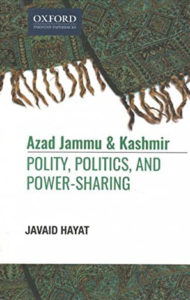
Tauseef Mustafa—AFP
A recent book calls for a new power-sharing framework between AJK and Pakistan to address power-imbalances and allow formation of democratic governance structure
 In Azad Jammu and Kashmir: Polity, Politics and Power-Sharing (OUP 2020), author Javaid Hayat raises some questions worth giving some thought. Hayat is a “pracademic” whose career journey has taken him from the public to non-profit sector in Asia, Europe, and North America, where he has worked with national and international NGOs in various capacities. He is a peace researcher and political scientist who earned his Ph.D. in Political Science from Freie Universitate, Germany, in 2014 and also holds two Master’s degrees in Peace, Conflict, and Development Studies from Universitate Jaume-I, Spain, and Mass Communication from University of the Punjab, Pakistan.
In Azad Jammu and Kashmir: Polity, Politics and Power-Sharing (OUP 2020), author Javaid Hayat raises some questions worth giving some thought. Hayat is a “pracademic” whose career journey has taken him from the public to non-profit sector in Asia, Europe, and North America, where he has worked with national and international NGOs in various capacities. He is a peace researcher and political scientist who earned his Ph.D. in Political Science from Freie Universitate, Germany, in 2014 and also holds two Master’s degrees in Peace, Conflict, and Development Studies from Universitate Jaume-I, Spain, and Mass Communication from University of the Punjab, Pakistan.
The book is prepared to discuss topics not usually tackled by the political orthodoxy in Pakistan. Some people in Pakistan-administered Kashmir, however, express the concern that they were put at risk of negative consequences if they continued talking about Azad Jammu and Kashmir (AJK) and its power-sharing relationship with Pakistan under the Interim Act of 1974.
Disputed dates and areas
AJK is the southernmost political entity within the Pakistan-administered part of the disputed princely state of Jammu and Kashmir. It is one of two disputed territories currently under the administration of Pakistan, namely AJK and Gilgit-Baltistan. On Oct. 24, 1947, the Azad State of Jammu and Kashmir was declared Azad Jammu and Kashmir. There is, however, disagreement on when exactly the provisional government of AJK was formed.
Some commentators claim that the set-up was formed on Oct. 4, 1947 but that its recognition took place on Oct. 24, 1947. Others in AJK claim that in reality the first declaration was on Oct. 4, 1947, when Ghulam Nabi Gilkar, bearing the name “Anwar,” announced a provisional government. They claim that the establishment of Azad Kashmir on Oct. 4, 1947 was actually a reconstitution of the announcement relating to the first declaration broadcast over Radio Pakistan.
Gulab Singh buys Kashmir
Maharaja Gulab Singh had bought Kashmir from the Raja of Jammu, along with its inhabitants, for 7.5 million Nanak Shahi (then the prevalent currency of Punjab) plus the payment of other, relatively minor, annual tributes to the British government as the price for a cessation of hostilities.
The Treaty of Lahore had preceded the Treaty of Amritsar on March 9, 1846. Negotiated and signed between Dileep Singh Bahadur, the Maharaja of Lahore, and the British East India Company, the treaty was a consequence of the Anglo-Sikh war of 1845-6 in which the Sikh empire was defeated by the East India Company. The defeated Sikh empire did not have the financial resources to pay the huge amount of compensation demanded by the British. They were, however, able to cede the areas of Kashmir and Hazara, including forts, territories, rights and interests in the hilly regions situated between the Beas and Indus rivers, to the British East India Company in lieu of the indemnity payment demanded. In 1954, the constituent assembly of Jammu and Kashmir (Indian-Administered Kashmir) ratified the controversial accession to India. In 1956, it also passed a part of the constitution defining the state of Jammu and Kashmir as an integral part of the Union of India. Delhi cites these as reasons for not needing to hold a plebiscite, arguing that the constituent assembly is representative of the people of the state.
Including Gilgit-Baltistan
The administration and governance of AJK, including Gilgit-Baltistan, was entrusted to Pakistan under the UNCIP resolutions and thus the Government of Pakistan was responsible for providing governance mechanisms and processes to the “liberated” parts (AJK and Gilgit-Baltistan), until the final resolution of the Kashmir conflict. In fact, Pakistan’s responsibility under the UNCIP resolutions was to evacuate all its troops and other Pakistani citizens who entered Kashmir for the purpose of fighting after Aug. 15, 1947. Pakistan’s official position has been that until a plebiscite, as promised by the U.N., is held it will continue to administrate AJK and Gilgit-Baltistan, as only a plebiscite can determine the will of the people of J&K.
On April 28, 1949, an initial agreement was signed between the provisional AJK government and the Government of Pakistan, commonly known as the Karachi Agreement. According to this agreement, matters relating to defense, foreign policy, negotiations with UNCIP, and all affairs of Gilgit-Baltistan were to be the responsibility of the Government of Pakistan.
Gilgit-Baltistan and Karachi Agreement
Sardar Khalid Ibrahim (son and political successor of Sardar Ibrahim Khan, one of the signatories of the Karachi Agreement) held the opinion that the Karachi Agreement was the only document signed between AJK and the Government of Pakistan, which validated and provided legitimacy to AJK’s claim on Gilgit-Baltistan.
Since the establishment of AJK in 1947, the people there remained without any democratic system until 1960. No elections were held during that period and only individuals enjoying the confidence of the Working Committee of the Muslim Conference could be nominated as its president. In addition, the Ministry of Kashmir Affairs maintained tight control while adopting or amending the Rules of Business and its officials were not answerable to any authority.
Ruled from Islamabad?
Alas, the change in Islamabad’s approach, which had resulted in a more democratic dispensation for the people of AJK, was short-lived. When Zulfikar Ali Bhutto became the elected leader of a truncated Pakistan (East Pakistan became Bangladesh after the 1971 war, which, inter-alia, was a consequence of a failure in power-sharing between the two wings of the country), the elected parliament adopted a new constitution for Pakistan in 1973. Under the new constitution provincial autonomy was granted to Pakistan’s provinces and a parliamentary system of government was introduced. This regime change in Pakistan also brought with it a reversal in Islamabad’s approach when dealing with AJK. This changed approach was heavily influenced by Pakistan’s vulnerable and compromised bargaining position vis-à-vis the Simla Accord with India in 1972.
“A study of the political and constitutional evolution in AJK indicates that by establishing a separate ministry to ‘oversee’ AJK, and by enshrining constitutional clauses and creating institutions such as the AJK Council which best served its own interests, the Government of Pakistan systematically not only nullified the status of AJK but also tightened its control over AJK’s politics and economy,” reads Hayat’s analysis.
AJK and question of sovereignty
In the context of AJK, unlike the autonomous regions of Europe, the territory of AJK is not constitutionally a part of Pakistan, therefore its sovereignty, legally speaking, does not lie with Pakistan. The factual position is that AJK is a recognized disputed territory awaiting self-determination and its sovereignty is contested but is currently administered by the Government of Pakistan. Pakistan’s position to administer this region is thus provisional and subject to the Kashmir conflict and U.N. resolutions.
The author argues that given the Indo-Pak conflict over Kashmir—the destiny of which is yet to be decided—only wide-reaching autonomy could help address the legitimate rights of the people of AJK and empower its governance structure. The prevalent power-sharing framework under the Constitution Act of 1974 and AJK Interim Constitution (13th Amendment) not only undermines government authority but also lacks democratic merit. The disputed territory of AJK lacks domestic or internal sovereignty, which is crucial in building democratic governance in the disputed regions. Democracy can be introduced in the disputed territories only if their governments are completely autonomous except in matters agreed in advance between the parties.
Feeling of disempowerment
The new social contract or power-sharing framework is essential between AJK and Pakistan in order to achieve an autonomous governmental authority, which addresses power-imbalances and allows a democratic governance structure to be built. It is the responsibility of the Government of Pakistan to provide better governance and administration under UNCIP resolutions in the territories of Azad Kashmir and Gilgit- Baltistan. The principle of internal self-determination should be recognized until external self-determination is given to the people of the erstwhile state of J&K.
“Notwithstanding the powerlessness of AJK and in view of the overwhelming majority of Azad Kashmiris who feel constitutionally and economically disempowered by Islamabad, the territory remains relatively conflict free and the people of this territory feel emotionally connected to the people of Pakistan,” says the author. “This is unlike the situation in the valley of Kashmir, where the residents are antipathetic and bitter over Indian control. A recent non-violent intifada—that began in 2016 in the valley of Kashmir—is being dealt with an iron hand and fist by Indian security forces. The presence of black laws such as Armed Forces (Jammu and Kashmir) Special Powers Act 1990 and Jammu and Kashmir Public Safety Act 1978 and their application have resulted in gross human rights violations by the security forces, which have been widely reported in the international media and other organizations.”
